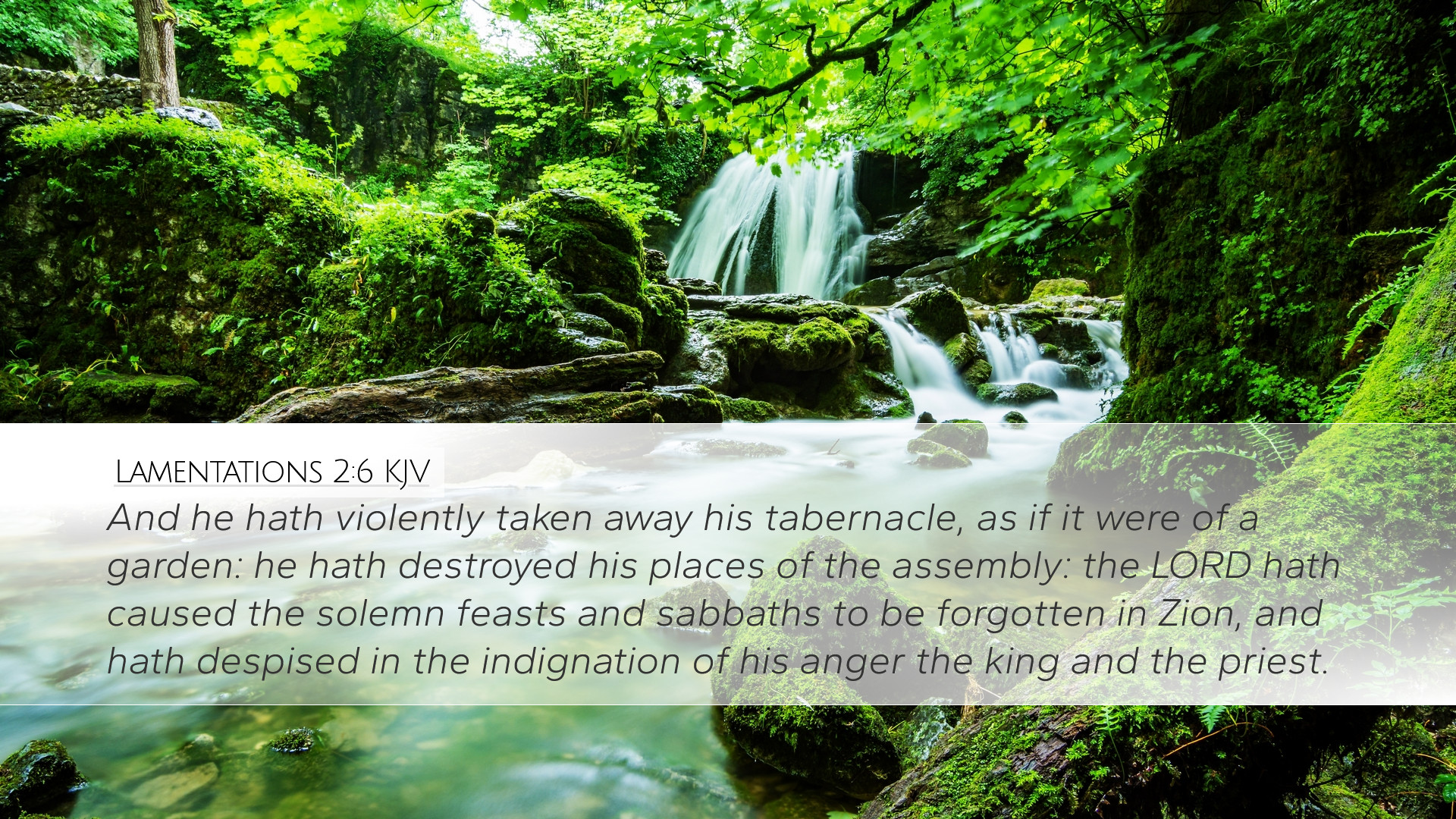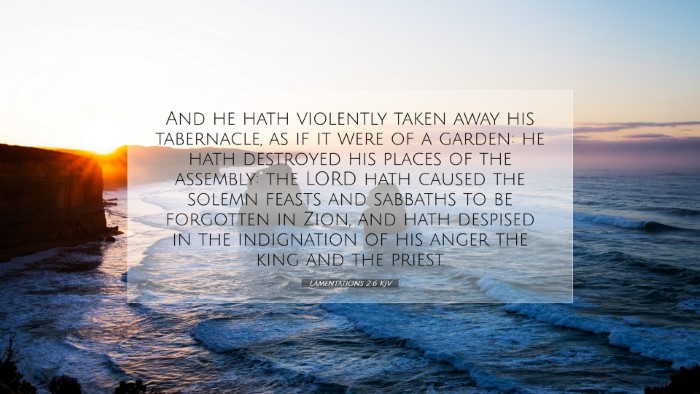Lamentations 2:6 - Commentary Summary
Lamentations 2:6 states: "And he has violently taken away his tabernacle, as if it were of a garden: he has destroyed his places of assembly: the Lord has caused the solemn feasts and sabbaths to be forgotten in Zion, and has despised in the indignation of his anger the king and the priest."
This verse captures a profound moment of lamentation rooted in the experience of loss and devastation following the siege of Jerusalem. It signifies not only the physical destruction of the city and its temple but also the spiritual desolation that accompanies such calamities.
Insights from Public Domain Commentaries
The verse underscores the destruction of sacred spaces and times, which are central to the Jewish faith, particularly in the context of the covenant relationship with God.
Matthew Henry's Commentary
Matthew Henry identifies the "tabernacle" as a metaphor for God’s presence among His people. He emphasizes that the destruction of the tabernacle signifies a withdrawal of divine protection and favor. Henry reflects on how the places of assembly, intended for worship and community, have been replaced by desolation and anger.
- Divine Presence Diminished: Henry points out that God’s tabernacle was central to Israel's worship, and its destruction illustrates the severity of their sins, leading to divine abandonment.
- The Impact on Worship: The solemn feasts and sabbaths highlighted the communal aspects of worship, which were now erased, indicating a mourning for lost traditions.
- Judgment Illustrated: The anger of God, as seen through the events described, serves as a warning to the people regarding the seriousness of their transgressions.
Albert Barnes' Commentary
Barnes emphasizes that the "tabernacle" signifies not just a physical building but represents the heart of Israel’s religious life. The strong language of "violently taken away" indicates the abruptness and inevitability of this judgment.
- Forced Forgetfulness: The mention of the feasts being forgotten signifies a loss of identity, which directly correlates with the people’s disobedience and the subsequent divine judgment.
- Leadership and Responsibility: Barnes notes the reference to the king and priest speaks to a broader failure of leadership. The rulers, intended to guide the people in righteousness, instead contributed to the spiritual downfall.
Adam Clarke's Commentary
Adam Clarke elaborates on the implications of the desolation described in the verse. He interprets the metaphor of the garden, suggesting that the Lord’s dwelling place was once cherished, akin to a flourishing garden, which now lies despoiled.
- A Contrast of Beauty and Destruction: Clarke draws attention to the stark contrast between the original glory of Zion and its current state of ruin, invoking feelings of deep sorrow.
- Theological Implications: Clarke remarks that the text illustrates profound truths about God’s holiness and the need for His people to maintain fidelity to His covenant.
Theological Reflections
Lamentations 2:6 serves as a potent reminder of the consequences of abandoning one’s covenant relationship with God. It encourages deep reflection on the nature of worship, community, and the role of divine judgment in the life of faith.
- Understanding Judgment: The verse challenges readers to consider how personal and communal sin can lead to consequences, demanding a response of repentance and seeking restoration.
- Hope Amidst Despair: In the midst of sorrow, the text points toward the necessity of returning to God and restoring relationships both with Him and within the community.
- Importance of Worship: The loss of feasts highlights the importance of worship in maintaining a vibrant faith. It calls believers today to prioritize communal worship and the observance of sacred times.
Conclusion
Lamentations 2:6 encapsulates the profound grief and realization of lost communion with God following the destruction brought upon by sin. The insights from Matthew Henry, Albert Barnes, and Adam Clarke provide a comprehensive understanding of the theological and practical implications of this verse, making it a significant point of reflection for pastors, students, and scholars alike.


